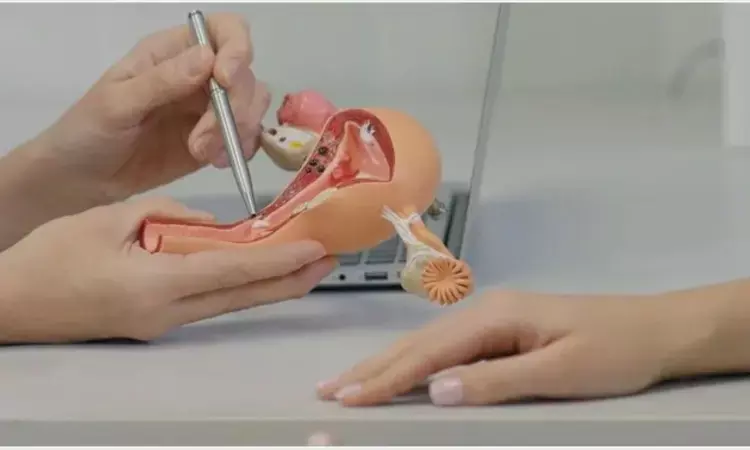- Home
- Medical news & Guidelines
- Anesthesiology
- Cardiology and CTVS
- Critical Care
- Dentistry
- Dermatology
- Diabetes and Endocrinology
- ENT
- Gastroenterology
- Medicine
- Nephrology
- Neurology
- Obstretics-Gynaecology
- Oncology
- Ophthalmology
- Orthopaedics
- Pediatrics-Neonatology
- Psychiatry
- Pulmonology
- Radiology
- Surgery
- Urology
- Laboratory Medicine
- Diet
- Nursing
- Paramedical
- Physiotherapy
- Health news
- Fact Check
- Bone Health Fact Check
- Brain Health Fact Check
- Cancer Related Fact Check
- Child Care Fact Check
- Dental and oral health fact check
- Diabetes and metabolic health fact check
- Diet and Nutrition Fact Check
- Eye and ENT Care Fact Check
- Fitness fact check
- Gut health fact check
- Heart health fact check
- Kidney health fact check
- Medical education fact check
- Men's health fact check
- Respiratory fact check
- Skin and hair care fact check
- Vaccine and Immunization fact check
- Women's health fact check
- AYUSH
- State News
- Andaman and Nicobar Islands
- Andhra Pradesh
- Arunachal Pradesh
- Assam
- Bihar
- Chandigarh
- Chattisgarh
- Dadra and Nagar Haveli
- Daman and Diu
- Delhi
- Goa
- Gujarat
- Haryana
- Himachal Pradesh
- Jammu & Kashmir
- Jharkhand
- Karnataka
- Kerala
- Ladakh
- Lakshadweep
- Madhya Pradesh
- Maharashtra
- Manipur
- Meghalaya
- Mizoram
- Nagaland
- Odisha
- Puducherry
- Punjab
- Rajasthan
- Sikkim
- Tamil Nadu
- Telangana
- Tripura
- Uttar Pradesh
- Uttrakhand
- West Bengal
- Medical Education
- Industry
Can simple hysterectomy be considered standard-of-care treatment for patients with low-risk cervical cancer?

Canada: Findings from the phase III SHAPE clinical trial have revealed simple hysterectomy (SH) with pelvic lymph node dissection to be a safe treatment option for women with early-stage, low-risk cervical cancer and help improve quality of life.
The trial showed a three-year pelvic recurrence rate in women who underwent a simple hysterectomy (2.5%) to be non-inferior to those who received a radical hysterectomy (2.2%). Better quality of life and fewer surgical complications were seen with a simple hysterectomy and pelvic node dissection (SH).
A radical hysterectomy involves the removal of the cervix, uterus, the tissue around the cervix, and upper vagina. In contrast, a simple hysterectomy removes only the cervix and uterus. For cervical cancer patients, a pelvic lymph node dissection is also an essential part of either surgery to exclude the presence of lymph node metastasis. Radical hysterectomy is a more complex surgery that requires more extensive surgical training; it is potentially associated with more acute and long-term side effects, such as bladder and ureteral injury, bleeding, and bowel and bladder dysfunction. It also negatively impacts sexual health and quality of life.
In patients with low-risk cervical cancer, there has been a trend towards less radical surgery in the last two decades. Retrospective data indicated that less radical surgery may be safe and tied to less morbidity. Marie Plante, Division of Gynecologic Oncology, Université Laval, CHU de Quebec, Quebec, QC, Canada, and colleagues aimed to compare radical hysterectomy and pelvic node dissection (RH) versus simple hysterectomy and pelvic node dissection in women with low-risk early-stage cervical cancer (LRESCC) in a non-inferiority phase III prospective randomized trial.
The study included 700 women (aged 24 to 80 years) with LRESCC, stage 1A2 or 1B1, with lesions ≤ 2cm and were randomized to RH or SH. The study's primary endpoint was determining whether pelvic recurrence at three years (PRR3) for simple hysterectomy was noninferior to radical hysterectomy. Secondary endpoints included quality of life, extrapelvic relapse-free survival (ERFS), and overall survival (OS).
The study revealed the following findings:
- The pelvic recurrence rate at three years with simple hysterectomy (2.5%) was not inferior to radical hysterectomy (2.2%).
- Extrapelvic relapse-free survival—98.1% with simple hysterectomy vs 99.7% with radical hysterectomy—and overall survival—99.1% with simple hysterectomy vs 99.4% with radical hysterectomy—were also comparable between the two groups.
- Twenty-one pelvic recurrences were identified after a median follow-up of 4.5 years: 11 in the simple hysterectomy group vs 10 in the radical hysterectomy group.
- Patients in the simple hysterectomy group experienced fewer intraoperative urologic surgical complications and fewer immediate and long-term bladder problems.
- Several quality-of-life aspects—such as body image, pain, and level of sexual activity—were also more favourable in the simple hysterectomy group. The surgical approach (abdominal surgery vs minimally invasive surgical procedure) did not seem to influence the risk of recurrence in either group.
- The rate of positive surgical margins was also low in both groups (2.6% overall; 2.1% with simple hysterectomy vs 2.9% with radical hysterectomy).
"The findings are important because it has demonstrated for the first time that a simple hysterectomy is a safe option for women with early-stage, low-risk cervical cancer," Plante and the team wrote. "This trial will likely be practice-changing, with the new standard-of-care treatment for the low-risk disease being a simple hysterectomy instead of radical hysterectomy."
The research was presented by Plante and the team at the 2023 ASCO (American Society of Clinical Oncology) Annual Meeting (Abstract LBA5511).
Dr Kamal Kant Kohli-MBBS, DTCD- a chest specialist with more than 30 years of practice and a flair for writing clinical articles, Dr Kamal Kant Kohli joined Medical Dialogues as a Chief Editor of Medical News. Besides writing articles, as an editor, he proofreads and verifies all the medical content published on Medical Dialogues including those coming from journals, studies,medical conferences,guidelines etc. Email: drkohli@medicaldialogues.in. Contact no. 011-43720751


